Hong Kong Steps into the Legal Spotlight — Why Should Financial Markets Care?

If you work in finance, "arbitration" probably doesn’t excite you the way a new AI model, bond issuance, or IPO pipeline might. But stay with us — because on May 30, 2025, China and over 30 countries formally signed the convention establishing the International Organization for Mediation (IOMed), with its headquarters to be located in Hong Kong’s historic Wan Chai Police Station.
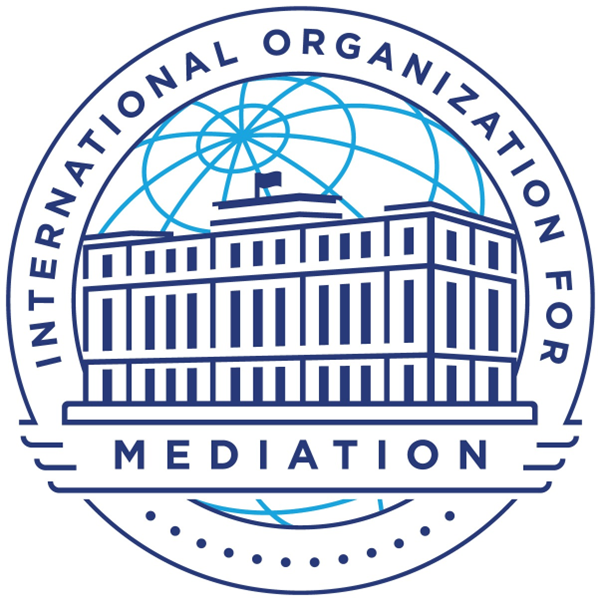
Attended by representatives from around 85 countries and nearly 20 international bodies, including the UN, this marks the world’s first intergovernmental institution dedicated exclusively to mediation — which complements, rather than replaces, traditional arbitration frameworks.
To put it plainly: this isn't just a new institution. It’s a message to markets, counterparties, and dealmakers that Hong Kong is doubling down on its unique role as a legal safe harbor in an uncertain world. That could change the way financial disputes are resolved, how deals are priced, and where contracts are enforced.
1.Arbitration and the Art of Financial Peacekeeping
Disputes are the unspoken constant in financial markets. They often arise quietly — sometimes years after a deal is struck — over NAV discrepancies, unfulfilled side letters, or stalled cash flows.
1.1 Why Arbitration over Litigation?
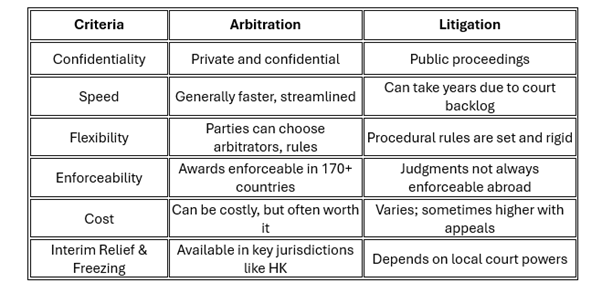
Arbitration is not simply a private alternative to litigation; it is often the only viable option when contracts span jurisdictions, involve complex instruments, or require quick, enforceable relief. With discretion, flexibility, and international enforceability, arbitration fits the financial ecosystem more snugly than court battles.

2.Why Arbitration Matters to Finance?
Arbitration is more than legal process — it is financial infrastructure.
2.1 Hong Kong Precedent: Hong Kong Court Support for Arbitration
Mutual Recognition by the PRC Supreme Court: China’s Supreme People’s Court has publicly affirmed its commitment to the 2000 reciprocal enforcement arrangement with Hong Kong. This makes Hong Kong the only common law jurisdiction with a formal mechanism for mutual enforcement of arbitration awards with Mainland China — a critical feature for deals involving PRC entities.
2.2 International Precedent: German Corporation vs Chinese Counterparty
In a widely referenced case, a German manufacturing company obtained an arbitral award in Hong Kong under ICC rules. The award was recognized and enforced by a Mainland Chinese court, despite the counterparty’s objection on procedural grounds. The Supreme People’s Court of China later endorsed the decision as a "model case" for cross-border arbitration cooperation. This ruling demonstrated how non-Chinese entities can leverage Hong Kong arbitration to enforce outcomes directly within the PRC legal system — an edge unmatched by any other common law jurisdiction.
2.3 ISDA Arbitration Clauses: A Real-World Use Case
The International Swaps and Derivatives Association (ISDA) has recognized the importance of international arbitration by publishing model arbitration clauses for use with its Master Agreements. Among the recommended venues is Hong Kong, specifically under the Hong Kong International Arbitration Center (HKIAC) rules.
This inclusion in ISDA’s framework reflects growing institutional confidence in Hong Kong as a neutral, enforceable venue — especially for disputes involving cross-border trades, or global financial products. It underscores how legal architecture is now embedded into front-office product design.
In financial structuring, enforceability is no longer an afterthought — it is value preservation. When disputes arise, the difference between a recoverable loss and a total write-off often lies in the jurisdictional architecture behind the contract.
3.Why Hong Kong, and Why Now?
Hong Kong’s arbitration infrastructure is both global and localized. It is one of the few jurisdictions that offers:
3.1 Legal Sophistication
On June 1, 2024, Hong Kong introduced revised Administered Arbitration Rules, incorporating user flexibility, expedited procedures, and modern digital protocols.
As of 2025, HKIAC remains among the top three arbitration institutions globally, based on user preferences reported in the most recent Queen Mary University of London and White & Case International Arbitration Survey. The survey gathered insights from 2,402 respondents and 117 interviews worldwide, reaffirming Hong Kong (31%) as the third most preferred arbitration seat globally — alongside Singapore (31%) and just behind London (34%).
3.2 Bilingual and Bi-jurisdictional Integration
As a common law jurisdiction operating in both English and Chinese, Hong Kong is uniquely suited for disputes involving PRC entities, Belt and Road investments, and hybrid international structures.
3.3 Strategic Institutional Evolution
The arrival of IOMed institutionalizes Hong Kong’s capability not just in arbitration, but also in mediation and Med-Arb (combined mediation-arbitration models). For complex disputes — such as joint ventures, family office governance, or DAO-related issues — this allows faster, layered solutions.
3.4 Regional Compatibility with Global Reach
No other center offers Hong Kong’s mix of local relevance (PRC enforceability) and international credibility (New York Convention enforcement). In short, Hong Kong bridges the East-West legal divide in ways others can’t.
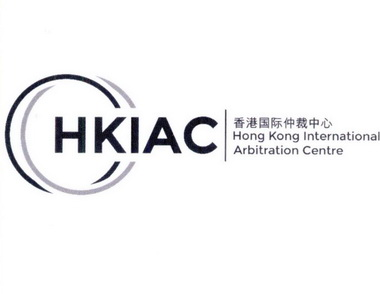
4.Why Should Investors Care?
This is not just a technical legal development. It has direct, material implications for family offices, hedge funds, crypto asset managers, private equity platforms, and anyone deploying or protecting capital in or through Asia.
4.1 Illustrative Scenarios That Hit Home
• Structured Note Default: You hold a note via a Hong Kong trust. The issuer defaults. Without a proper arbitration clause, enforcing rights across multiple jurisdictions becomes slow, costly, and public. If seated in Hong Kong, dispute resolution remains confidential, enforceable, and swift.
• Tokenized RWA Redemption Dispute: You subscribe to a DeFi protocol offering real-world asset exposure. The smart contract suggests a redemption window opens — but the issuer disputes it. With a Hong Kong-seated arbitration clause, you have recourse to a system that understands both blockchain and real-world enforcement.
• Cayman Fund Side Letter Breakdown: Your Cayman feeder fund is administered out of Hong Kong. A side letter dispute over fee waterfalls or redemption timing arises. A Hong Kong arbitration venue means you avoid litigation entanglements in Cayman, the BVI, and PRC.
4.2 Tangible Advantages for Investors
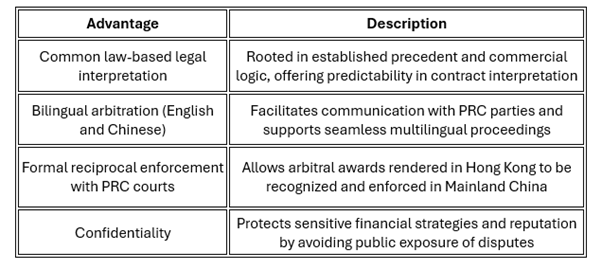
In essence: when friction arises, Hong Kong may not just be a better option — it may be the only option that balances enforceability, neutrality, and cultural alignment in Asia-facing deals.
5.Comparision between Hong Kong with Global Legal Centers
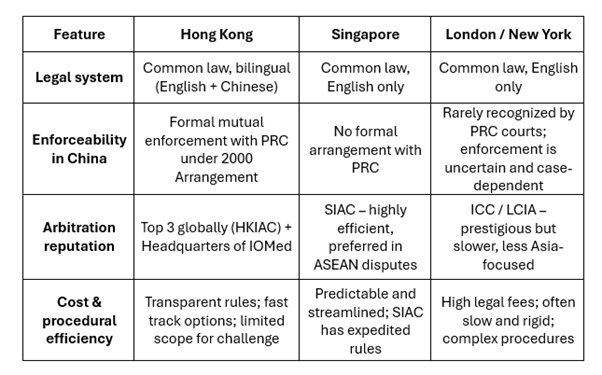

5.1 Limitations and Challenges of Hong Kong as an Arbitration Seat
Despite Hong Kong’s many strengths as an arbitration hub, a few limitations are worth noting — particularly for global investors navigating regulatory, geopolitical, or reputational risk.
5.1.1 Perception of Political Integration
While Hong Kong operates under a separate legal system, some Western parties remain cautious due to perceptions of closer alignment with Mainland China. This can affect decisions in politically sensitive or reputationally exposed transactions.
5.1.2 Sanctions Complexity
When disputes involve sanctioned individuals or entities (especially from the U.S. or EU), enforcement through Hong Kong may face delays or complications, particularly if parallel litigation is active elsewhere.
5.1.3 Reputation and Optics
Media narratives sometimes cast doubt on Hong Kong’s judicial independence. This perception — though not always grounded in legal reality — may influence counterparties unfamiliar with the city’s proven enforcement record.
6.Final Thoughts: Arbitration Is Boring — Until It's Everything
Few people negotiate a term sheet thinking it will end in arbitration. But when deals go sideways — and some always do — your dispute venue defines whether you get back 80%, 40%, or nothing.
Hong Kong’s twin identity as a financial center and legal capital positions it to anchor a future where legal certainty is rare and valued. In a world of increasing regulatory divergence and political polarization, enforceability is currency.
Hong Kong is one of the few places where:
• East meets West — legally, linguistically, and culturally
• Courts enforce contracts with speed, predictability, and discretion
• Global investors and Chinese counterparties can meet on neutral ground
If you’re serious about resilience in your financial architecture, your dispute clause should be as well-designed as your investment thesis.
And if you want that clause to actually work with high degree of confidence — look to Hong Kong.
